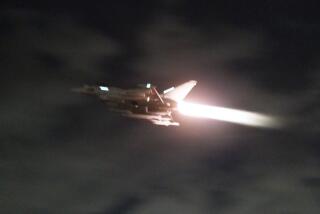Senate Report Says U.S. Can Be Drawn Into War
- Share via
WASHINGTON — The United States, pursuing a “dangerously nebulous” policy in the Persian Gulf, risks being drawn into the Iran-Iraq War as an active ally of Iraq, a Senate staff report issued Sunday warned.
The stated U.S. mission of protecting re-registered Kuwaiti oil tankers and preserving freedom of navigation in international waters has been so poorly drawn and inconsistently carried out that it invites Iranian attacks and fuels prospects for an escalating gulf war, the 63-page study also charges.
“Overall, American policy toward the warring nations has comprised first a tilt toward Iraq, then arms sales to Iran, and now an even stronger involvement on Iraq’s side,” the report states. “This incoherent policy has been confusing to the nations of the region and debilitating to American credibility.”
Prepared by 3 Democrats
The report was prepared by three Democratic staff members of the Senate Foreign Relations Committee after a recent tour of the gulf region. It does not represent a committee position paper, nor is it likely to be embraced by the Republican minority because of its biting criticism of Reagan Administration policy.
An aide to Sen. Richard G. Lugar (R-Ind.), a senior minority member of the committee, called the report “a highly partisan attack.” He said it offers “really nothing new in terms of the criticism that the Democratic staff has had of Administration policy” in the gulf. Other Republican members of the committee said Sunday they had not seen the report and could not comment on it.
The report warned that Iraq is incapable of winning the gulf war and is in danger of losing it because it has neither the manpower nor the economic resources available to Iran, a much larger and richer country.
Iraqi Defeat Quite Possible
“An Iraqi defeat, which must now be regarded as a realistic possibility, would immediately threaten the sparsely populated Arab gulf monarchies,” the report said.
Because of Iraq’s perilous position in the war with Iran and the military weakness of gulf states such as Kuwait, Bahrain, Oman and the United Arab Emirates, Western military assistance will be required “for the foreseeable future,” the report said. The situation threatens to pull the United States, which already has more than 30 warships and 15,000 servicemen in the region, deeper into a quagmire with no apparent exit, the staff study asserted.
“This report shows the danger of a possible Iraqi collapse is greater than commonly understood and that the perils for the U.S. in the gulf are certain to increase,” Sen. Claiborne Pell (D-R.I.), the committee chairman, said in a statement Sunday.
Kuwait Sabotage Revealed
The report, written before Friday’s Silkworm missile attack on the U.S.-registered Sea Isle City in Kuwaiti waters, revealed that an apparent act of sabotage on May 22 damaged a $5-billion Kuwaiti oil refinery at Al Ahmadi, where the Sea Isle City was docked awaiting refueling.
A pipeline carrying explosive liquid petroleum gas caught fire after having been tampered with, the refinery’s manager told the congressional investigators. The incident “came within a whisker of a major catastrophe,” the Kuwaiti official said. If the fire had not been contained and the gas tank had exploded, he added, “all the neighboring communities to the north and south would have been vaporized.”
The incident dramatized the vulnerability of Kuwait and the other small states along the western edge of the gulf, the report said. They not only are militarily unable to stand up to Iran, but are also threatened by acts of sabotage and subversion by Shia minorities sympathetic to the Iranian fundamentalist revolution.
Pressure for Weapons
The report also said that U.S. policy makers will come under increasing pressure from the gulf states to sell them a greater quantity of U.S. arms and more sophisticated weapons, such as the heat-seeking Stinger anti-aircraft missile. Officials in Kuwait, Bahrain, Qatar and the United Arab Emirates all expressed a desire to buy the Stinger, which has proven effective against aircraft in Afghanistan and Angola. The United States sold the missile to guerrilla groups fighting Soviet-backed forces in those countries.
American officials are concerned about the proliferation of the Stinger because the weapon may fall into unfriendly hands. Iran reportedly acquired a quantity of the weapons by hijacking a convoy of Afghan guerrillas this spring, and Stinger equipment was found in an Iranian gunboat after it was shot up by U.S. helicopters 10 days ago.
The report said that U.S. policy in the gulf is based on three basic principles: ensuring the free flow of oil, preventing Soviet encroachment in the vital region and defending freedom of navigation. However, the report stated, “none of these rationales is greatly persuasive.”
Despite accelerating attacks on commercial shipping in the waterway, oil supplies have not been jeopardized, in part because of the growing use of overland pipelines to carry oil to safer ports, the report said.
‘Ingrained Arab Suspicions’
Soviet gains in the region are limited by “ingrained Arab suspicions of Soviet power and purpose,” the staffers concluded. Ironically, they said, Soviet purposes are being advanced by the U.S. tilt toward Iraq, which is driving Iran closer to the Soviet camp.
Nor is freedom of navigation served by the U.S. naval presence or that of an estimated 70 warships from North Atlantic Treaty Organization nations that have recently sailed to the gulf, the report said.
More to Read
Sign up for Essential California
The most important California stories and recommendations in your inbox every morning.
You may occasionally receive promotional content from the Los Angeles Times.










